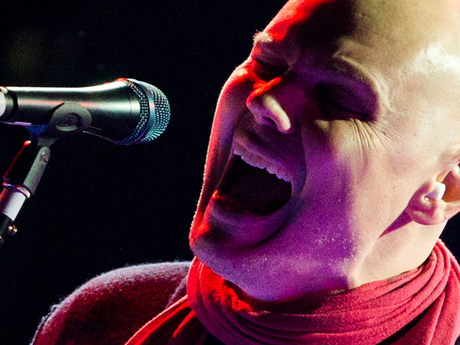
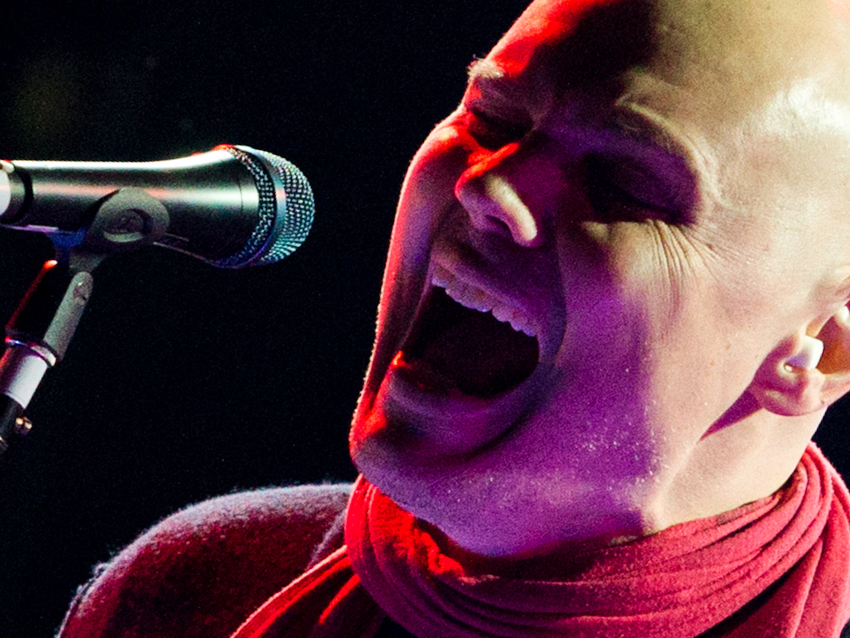
Billy Corgan says the upcoming Smashing Pumpkins disc Oceania will "lead to new chapters" for the band. © RD/ Kabik/Retna Ltd./Corbis
"This is the craziest time for The Smashing Pumpkins since the mid-'90s," says Billy Corgan over a cup of tea in his dressing room at New York's Terminal 5. "We just finished Oceania, but we don't know when it's coming out. We don't have management, and we don't have a record label. We don't know what we're doing or when we're doing it."
Hearing his own words, Corgan chuckles as stray noises of pre-soundcheck activity filter in through the closed door. It might be a crazy time for the Pumpkins (which also includes guitarist Jeff Schroeder, bassist Nicole Fiorentino and drummer Mike Byrne), but it's a good time, too, and they're still capable of whipping up fan frenzy. Terminal 5 is ridiculously sold-out, and in just a few hours the band will play a healthy portion of Oceania's 13 cuts before an intimate, rapturous crowd of 3,000, many of whom are already lining the streets outside.
Corgan has his main stage guitar, one of his signature Fender Stratocasters, on his lap. He plucks at it occasionally, demonstrating one of the forthcoming album's riffs as he sings softly, his voice full of purpose and tender emotion.
"This tour has been very interesting and gratifying," he says, sipping his tea. "What's especially nice is that we're playing to an audience that's actually realizing that they like The Smashing Pumpkins' new music a whole lot. The excitement level is through the roof and the expectation is incredible. People are looking at me and going, 'Oh yeah, he can still…blank.' Whatever 'blank' is that people might like. 'Hey, we want to see you blank some more."
Over the past few years, MusicRadar has conducted several extensive interviews with Billy Corgan, who has always proved to be refreshingly candid and self-critical. Our following conversation is no less frank. Even with the frenetic pace of touring dictating the order of the day, the main man of the Pumpkins gets to the heart of the matter. (Plus, check out our video of Billy Corgan showing off his two main stage guitars.)
You talk about the band not having management or a label. Surely, these shouldn't be problems for you to sort out.
Get the MusicRadar Newsletter
Want all the hottest music and gear news, reviews, deals, features and more, direct to your inbox? Sign up here.
"Well, the good news is that the response to the new music is overwhelmingly positive. Suddenly, I'm being chased again. [laughs] It's been a while since I've been in that situation. I have to laugh, because basically I've been sitting around for 10 years waiting to be chased. It's a good feeling. The band is on fire, and we're headed in the right direction."
Originally, Oceania was coming out this year, but now it's been moved to 2012…
"It's definitely coming out in 2012. It's a long, complicated story. The funny thing is, the response to it has been so great that we said, 'OK, we have to figure this out.' Because if we were to just put it out and it wasn't set up properly, we'd really be missing an opportunity. It's the most positive response to a record that I've had since the mid-'90s.
"It's kind of weird, though, because I got used to people saying, 'Yeah, it's good, but…' There was always a 'but' there. [laughs] This is the first record I've had in 15 years where there's no 'but.' Now it's just 'Wow! Amazing…epic…wow!' There's a lot of 'wow!'"
The last time we spoke, you were a quarter of the way into recording the album. Now that it's done, how do you feel about it? Presumably, you feel good.
"This might sound disingenuous, but I'm more focused on the future. What I mean by that is, we've turned a corner where the band is in real-time in their connection to the music, and the music is connected to where we are as people. It's not like we're in a hurry to get past what we've just done, but now the highway is open and there's so much more we can do. I think it's the first chapter in a whole series of chapters."
You sound very excited. You are excited!
"I am. You know, a) it's nice to have people like the record, because I've gotten used to people not liking what I do, and b) I'm back in a place where it all makes sense. That's what I'm most happy about. I'm so proud of this record. Oceania stands up with my best work. It really does open up new possibilities and will lead to new chapters for us.
"What's also cool is the live show we're doing. Right now, we're playing three singles in the set: Cherub Rock, Siva and Bullet With Butterfly Wings. The modern karaoke audience just wants you to play the hits, but The Smashing Pumpkins were never about that. It's difficult when an audience just wants the hits, because it's counterintuitive to why the band exists. So we've gone back to the old model of 'Hey, we're just gonna blow your minds!'
"We can be musical again. We can be exciting, we can push boundaries, we can be avant-garde - it's not always about the past. It gets to be such an old drumbeat: the past, the past, the past. [pauses, smiles] OK, now let's talk about the reissues!" [laughs]
When you announced that you were doing Oceania as a full album - an "album within an album" - you indicated that it was something of an experiment.
"Right, sure."
Now that it's finished and you're getting good response, would you consider recording another full album, or are you just not ready to go there yet?
"I would. I can see where we'll make another album after this. The difficulty is that it's such a consuming thing in my life. Making Oceania, I basically had six months of no life. I was in Chicago for half a year, and making this record is all I did.
"It's different for me now. When you're 24 and you can't wait to get your video on MTV, somebody can sell you the idea of doing nothing else for six months. But if you're 44 - uncertain, not sure who's going to listen, no idea where things are going - six months is a really big commitment.
"I know this might sound trite, but I want to play with my dogs. I want to go shopping. I want to stand on the beach and look out at the water."
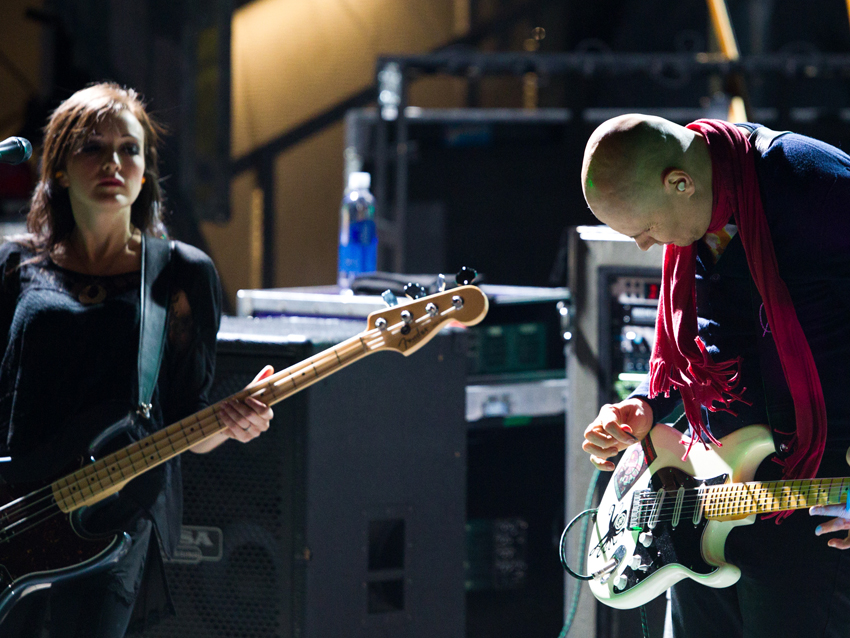
Bassist Nicole Fiorentino and Corgan on stage. "The band is on fire," says Corgan. © RD/ Kabik/Retna Ltd./Corbis
That doesn't sound trite at all.
"See, I give up a lot of those things, and it makes it very difficult when you don't get the response to your work that matches what you've put into it. You start to think, Why am I giving up my life when my work isn't connecting with people in their lives? It's not like there has to be this fair trade, and after all, it is my decision to do what I do. But making an album is very consuming. I wish there was another way, but I've never found it."
Of the new songs that you're playing live, is there any one that's surprising you the most?
"Oceania. It's a long song, it's about 10 minutes plus. You know, you're told over and over again that the audience has no attention span, they're going to look at their phones, they need something short. Yet here we are, playing a 10-minute song, and people are excited.
"It proves the point: It you can create something that's emotional and draws the audience in, time is not the issue. Volume is not the issue. Your guitar tone is not the issue. You see things on YouTube all the time - the cat playing the piano. [laughs] If you make something that people feel good about, they'll get into it.
"I've been very surprised at how positive the response to the song has been and how people are getting it right away. I might have expected that they wouldn't, but the fact that they are is great. Hearing people go 'Yea!' to a new song is a welcome change. I've had a lot of 'Hmm…' the past few years. You get used to 'Hmm…'"
But how did you deal with "Hmm…"? That couldn't have been easy.
"It wasn't. When I was younger, I got really angry. Then I got sort of bitter, like, 'This sucks. Shouldn't I be given more of an opportunity here?' Eventually, I realized that you have to trust the public's opinion. Even if they're wrong, they're right. You know what I mean? If they like Justin Bieber, you can't say, 'No, don't like Justin Bieber.' They're going to gravitate towards what they want, and you have to accept that.
"Looking back at where I've gotten it right at the highest level, the public has always responded positively. Now, what pisses me off is that once an artist has risen to the highest level, and I'll take myself out of the conversation…I'm talking about a Bob Dylan, a Tom Waits, a Neil Young, a Johnny Cash…once they prove that to you, if they put something out and it doesn't hit a home run, it doesn't mean that they've 'lost it.' It means they're on a journey. They're out there looking for that next vein of gold, and sometimes you have to go way out into the forest or the desert to find it.
"So that bothers me. It gets into an area of distrust. You hit your head, and you start to think that you've forgotten how to write a pop song. The whole thing is ridiculous, because I didn't wake up one day and say, 'I'm going to write a song with tom-toms and it'll be about rats in a cage.' In fact, with Mellon Collie, which became a huge album, I had to be talked into releasing Bullet With Butterfly Wings by Phil Quartararo, who was the president of Virgin Records at the time. I wanted another song to be the first single."
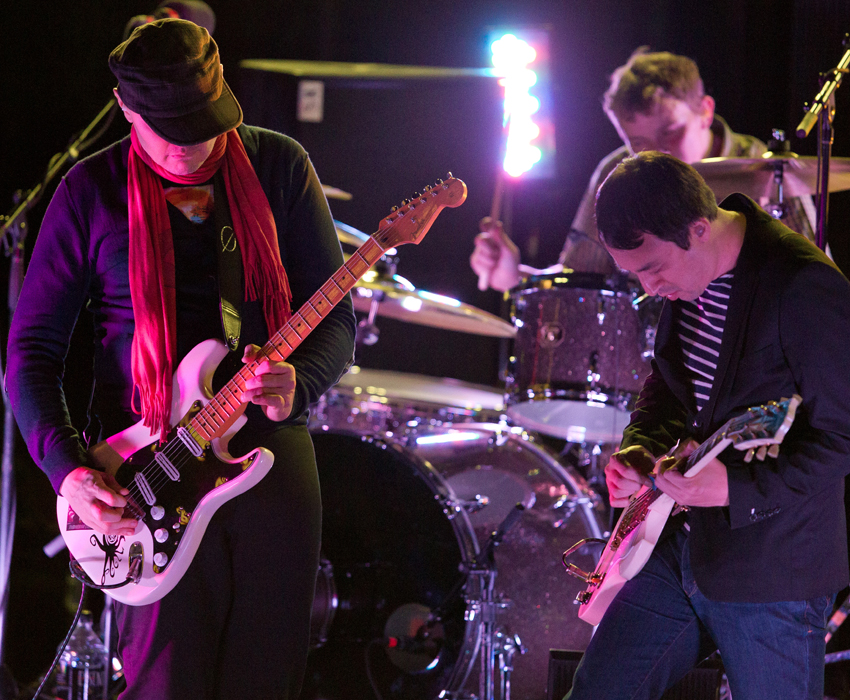
On stage with drummer Mike Byrne and guitarist Jeff Schroeder. "We can be musical again...avant-garde," says Corgan. © RD/ Kabik/Retna Ltd./Corbis
Which song was that?
"Jellybelly. I thought that was more in line with how The Smashing Pumpkins should be represented. This was after eight months of work. And nobody ever talks to me about Jellybelly, yet every night when we play Bullet people yell and scream and jump all over the place. Just because I'm the artist doesn't mean I always know. The public will tell you when you're right.
"At the same time, you have to be allowed to graduate to a different class. I don't want to compete with 20-year-olds as if we have the same goals. We don't. I don't wake up every morning wanting to get laid. Sure, when I was 20, that's what I wanted - I wanted to get crazy and jump around. When you're 44, you have different values and goals. You should be allowed to pursue those goals and not feel as if they're small and don't mean anything."
Let's get into how the band functions musically these days. How do you and Jeff connect on a guitar level, particularly with the older songs?
"For the most part, Jeff plays what used to be James' parts, and I play what used to be my parts. In certain places, Jeff plays my guitar parts because in the old Pumpkins there were things that James couldn't play, and I'd have to play them and sing at the same time. Jeff is such a good guitar player that he can play my parts and let me do a better job of singing.
"As far as the rest of it, we don't talk about it that much. As an example, there's a song from Adore called For Martha, and we put a coda on it where there's sort of a lead at the end. In a rehearsal, originally Jeff was taking the first lead, and then I'd play the second lead, and then I'd do a vocal and it would be the end of the song.
"After we played it live a few times, I just let him play the whole solo. What he was playing was so good, so I just felt like I should get out of the way. He was seizing the moment better than I was. [shrugs] Hey, it's my song, and it works better that way. I can do what I want with it."
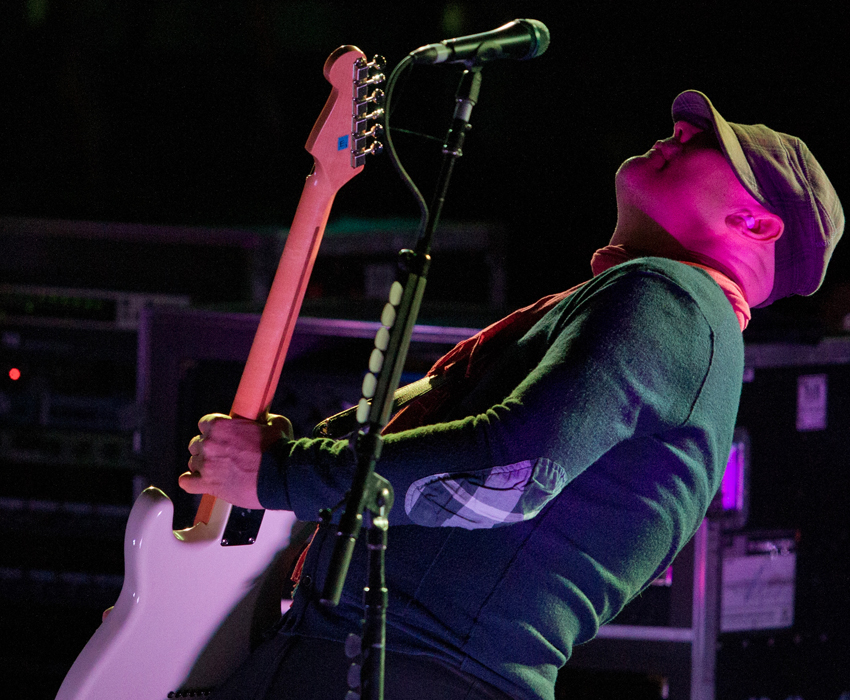
Reaching for the highest level. © RD/ Kabik/Retna Ltd./Corbis
So there's a kind of telepathy thing going on? In many great two-guitar bands, an unspoken form of communication exists between the players.
"Yes, but what's tricky sometimes with us is, we're both lead guitar players. It's not like I'm the lead guitarist and he's the rhythm player but he can play an occasional lead - Jeff is a bona fide lead guitar player. So sometimes we do have to talk about how to clear out and make space for each other."
And how about the band's musical relationship with Mike Byrne? In most bands, the drummer sets the tone, the pace, and the other players follow what the drummer does.
"That can be true, but in this regard Mike is different. See, Jimmy Chamberlin was very much from the school of big bands, and his mentality was to drive the band - he would cite people like Gene Krupa as an influence."
"Mike is very much a groove drummer. He's focused on how time separates or delineates itself. Because he's such a great timekeeper, it frees us up to improvise within the spaces. We still play to Mike, but we're more like four people playing individually and collectively as opposed to playing to the drummer and driving outwards.
"It's the difference between when Jimi Hendrix played with Mitch Mitchell versus when he played with Buddy Miles. When Hendrix played with Buddy Miles, he played freer and in a more avant-garde fashion because he had somebody chopping the time for him. Mike has that flair, but he's very much a groove drummer."
Going back to what we were talking about earlier, needing to grow and mutate, you remind me of John Lennon after The Beatles broke up and he put out the Plastic Ono Band album.
"I'll say this: To anyone who's followed my musical life…there's been some really difficult times. There's been some amazing times, and there's been some hard times. But I've had an incredible journey. I've experienced things that a musician who leads by fear will never know.
"I've played with some of the greatest artists in the world. I've had crazy stuff happen and have found myself in situations I never would have expected. I've learned musical lessons that people who are bored or scared never would because it would be out of their range.
"At the end of the day, if it is about my life, I've had an incredible life as a musician. If I've had a shit life as a pop star, I don't really care. I was raised to be a musician."
Joe is a freelance journalist who has, over the past few decades, interviewed hundreds of guitarists for Guitar World, Guitar Player, MusicRadar and Classic Rock. He is also a former editor of Guitar World, contributing writer for Guitar Aficionado and VP of A&R for Island Records. He’s an enthusiastic guitarist, but he’s nowhere near the likes of the people he interviews. Surprisingly, his skills are more suited to the drums. If you need a drummer for your Beatles tribute band, look him up.
“I said, ‘Are we sure we can write a song about death?’”: The story of Mike + The Mechanics' classic No.1 The Living Years
“I parted company with my trusty Fender Strat, previously owned by Lemmy, and part exchanged it for a flute. It just looked nice and shiny!”: How Jethro Tull's Ian Anderson became rock’s leading one-legged flautist










